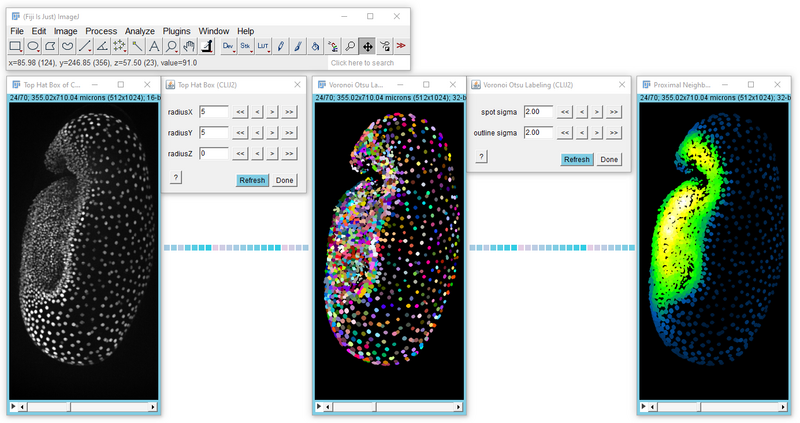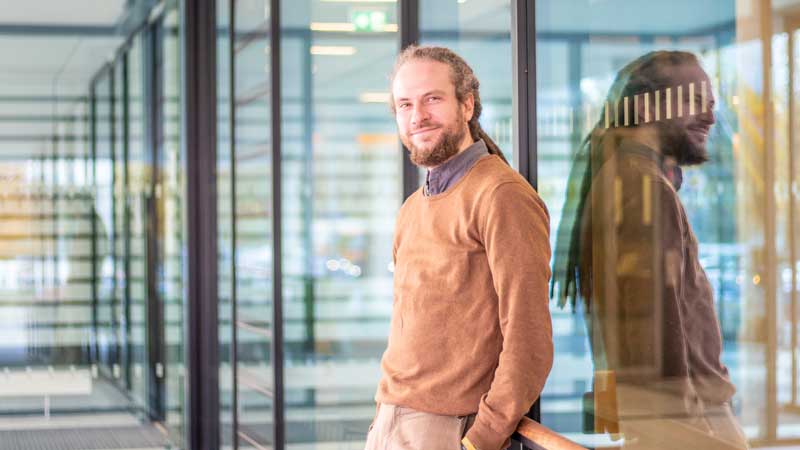PRESS RELEASE
Dresden, 01/10/2021
Bio-image analysis experts from the DFG Cluster of Excellence Physics of Life at TU Dresden, the Institut Pasteur in Paris, and the Francis Crick Institute in London have been awarded an ‘Essential Open Source Software for Science’ grant by the Chan Zuckerberg Initiative (CZI) for leveraging GPU accelerated image analysis. The researchers plan to develop and distribute knowledge about this rising technology so that scientists worldwide profit from it. The aim is to enable end-users to process large-scale biological image data.
Biological image data science is on the rise due to a constant influx of staggering amounts of new images from microscopes produced by e.g. scientists aiming at understanding the physics of life. “Both, experts and computational infrastructure, are overwhelmed by the vast amount of image data to be analyzed in biological and biophysics research. Smart distribution of knowledge and work is key,” explains Robert Haase, project leader and group leader at the DFG Cluster of Excellence Physics of Life (PoL) of the TU Dresden. “Modern volume electron microscopy techniques produce incredible images, but also are a major challenge in extracting meaning from the vast quantities of pixels showing structure of life.” adds Martin Jones, project partner and deputy head of Microscopy Prototyping at the Francis Crick Institute in London. “It is important to integrate cutting-edge technologies into modern science. Solutions for large data analysis exist, it is up to us to make them accessible within a reliable and robust open-source solution tailored for researchers,” describes Stéphane Rigaud, project partner and research engineer at the Institut Pasteur in Paris. “There is no greater challenge, or opportunity, in imaging science than speeding up and automating bioimage analysis. Advances in this domain will convert imaging science from a qualitative to a quantitative field, thereby supporting discovery in bioscience and clinical research,” says Lucy Collinson, project partner and Head of Electron Microscopy (EM) at the Francis Crick Institute in London.
The multinational team from the Institut Pasteur in Paris, the Francis Crick Institute in London and PoL scientists in Dresden will develop solutions for distributed, accelerated image analysis that is accessible to end-users without programming experience. “With this project we combine technical and community efforts to provide the best possible methods to the people who need them the most, the scientists at the bench. We very much look forward to seeing the benefits to the volume EM community and beyond!” comments Martin Jones.
“Following the tradition of the Network of European Bio-Image Analysts (NEUBIAS), we will distribute knowledge about accelerated image processing on a European level. We are very glad that CZI funds our efforts in networking and joining efforts on this exciting topic.” adds Robert Haase. In the coming two years, the three partners will work closely together. To foster interaction with the life-sciences community, the team will plan NEUBIAS-style symposia, training schools, and hackathons hosted by the Cluster of Excellence Physics of Life at TU Dresden, the Institut Pasteur in Paris, and the Francis Crick Institute in London to exchange knowledge, ideas and experience. The software will be available open source and the teaching materials will be shared with the community open access.
More information about the project can be found on the website of the Chan Zuckerberg Initiative.
About the Chan Zuckerberg Initiative
The Chan Zuckerberg Initiative was founded in 2015 to help solve some of society’s toughest challenges – from eradicating disease and improving education, to addressing the needs of our local communities. Our mission is to build a more inclusive, just, and healthy future for everyone. For more information, please visit www.chanzuckerberg.com.
About PoL - Cluster of Excellence Physics of Life
The Cluster of Excellence Physics of Life (PoL) at TU Dresden focuses on the laws of physics that underlie the organization of life into molecules, cells and tissues. At the cluster, physicists, biologists and computer scientists join forces to investigate how active matter organizes itself into predetermined structures in cells and tissues, thus giving rise to life. PoL is funded by the DFG as part of the Excellence Strategy. It is a collaboration between scientists from TU Dresden and research institutions of the DRESDEN-concept network, such as the Max Planck Institute of Molecular Cell Biology and Genetics (MPI-CBG), the Max Planck Institute for the Physics of Complex Systems (MPI-PKS), the Leibniz Institute of Polymer Research (IPF) and the Helmholtz-Zentrum Dresden-Rossendorf (HZDR). www.physics-of-life.tu-dresden.de
Further information:
Dr. Robert Haase
Email: robert.haase@tu-dresden.de
Website of the Bio-image Analysis Group
Media contact PoL:
Bianka Claus
DFG Cluster of Excellence Physics of Life (PoL), TU Dresden
Public relations
Phone: +49 351 463-41247
Email: bianka.claus@tu-dresden.de

